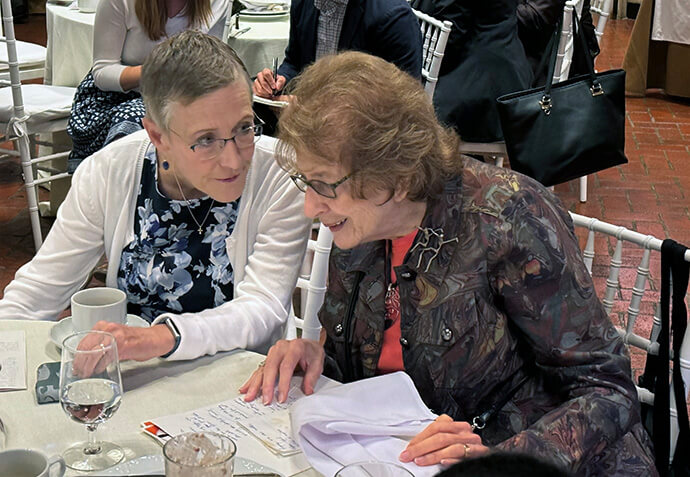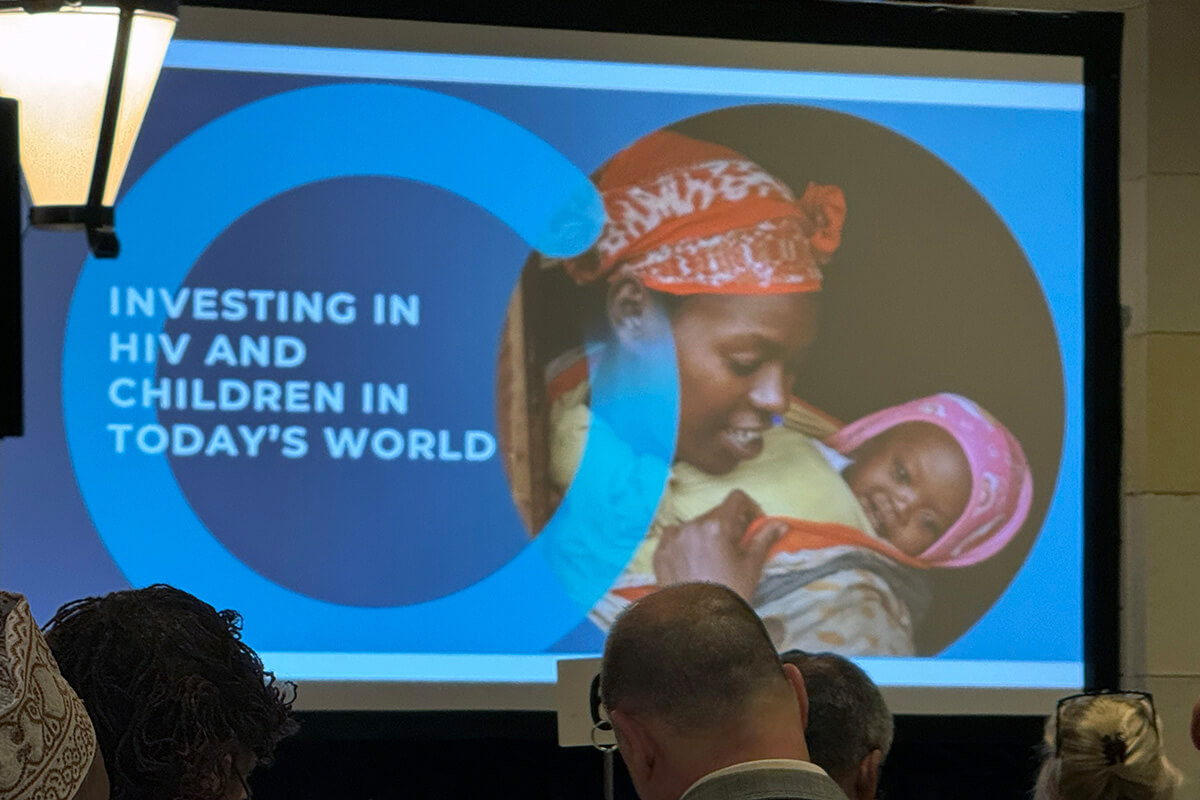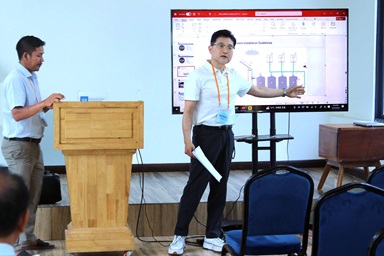Key points:
- “Put People First” was the theme of two worldwide conferences focused on combating the global spread of HIV.
- The United Methodist Book of Resolutions has long recommended congregations recognize World AIDS Day, observed on Dec. 1 every year, with healing prayers and voluntary offerings.
- One United Methodist participant noted that since World AIDS Day this year falls on the first Sunday of Advent, “every local church can light the Advent candle of hope, remembering the needs of the 40 million people living globally with HIV.”
As churches observe World AIDS Day on Dec. 1, they can take inspiration from the theme of two recent worldwide conferences to “Put People First.”
That was the focus of the 25th International AIDS Conference and Interfaith Pre-Conference in Munich, Germany, July 20-26, and the annual AIDS Interfaith Breakfast in New York, Sept. 25, jointly sponsored by UNAIDS, the United States President’s Emergency Plan for AIDS Relief and the World Council of Churches.
The United Methodist Book of Resolutions has long recommended congregations recognize World AIDS Day with healing prayers and voluntary offerings.
Following the Interfaith Breakfast, Shirley Struchen, a retired United Methodist journalist and former executive director of the Religion Communicators Council, commented that “since World AIDS Day this year falls on the first Sunday of Advent, every local church can light the Advent candle of hope, remembering the needs of the 40 million people living globally with HIV.”
Hope permeated the agenda of the Munich conference when some 15,000 of the world’s leading scientists, policymakers, health care professionals, faith leaders and people living with HIV met and stressed “putting people first.” Speaker after speaker emphasized that by prioritizing people, they hoped the stigma that stymies effective health care progress toward ending HIV and AIDS might be overcome. AIDS activists claim that, too often, “pathogens, not people, take priority.”

Putting people first also means reaching out to highly marginalized people in society: sex workers, people who inject drugs, transgender individuals or men who have sex with men.
From a scientific perspective, the “put people first” principle means tackling AIDS from an evidence-based health care approach, rather than using an ideological, religious or political methodology.
Chin Keong Tan from Singapore, a conference attendee in Munich representing the Center for Health and Hope, noted that “putting people first” is a recurring theme of Jesus’ life and teachings.
“In the Gospel of Matthew, he broke theological laws by feeding the hungry and healing the sick on the Sabbath. Jesus said it was ‘lawful to do good’ even when it violated religious dogma,” Tan said. The Center for Health and Hope, which has United Methodist ties, supports and advocates for people infected and affected by HIV and AIDS around the world.
Christine Stegling, UNAIDS deputy executive director, declared that the faith community’s participation is vital in combating the spread of the disease.
“Unless churches, mosques, temples and synagogues help combat the stigma and discrimination that keep people from getting tested and treated, then the global goal of ending HIV as a public health threat by 2030 cannot be achieved,” she said.
Francisca Merico, HIV campaign coordinator for the World Council of Churches’ Ecumenical Advocacy Alliance, urged faith groups to adopt science-based approaches to HIV, opening houses of worship for community-based health service providers and encouraging religious leaders to be advocates for the marginalized.
“Religion has the potential for improving global health. Yet too many faith communities are sources of anti-gay rhetoric and remain unfriendly to persons living with HIV,” Merico said.
The Rev. Anne Burghardt, top executive of the Lutheran World Federation, lamented that “HIV is a forgotten health issue in the church.” She further called on faith communities “to counter misleading theologies that portray HIV as a punishment of God.”
Subscribe to our
e-newsletter
A new medical advancement has given cause for hope. In controlled trials, Lenacapavir, a twice-yearly injectable medication, gave 100% protection against HIV infection in cisgender women in South Africa and Uganda. Winnie Byanyima, UNAIDS executive director, described it as “a miracle prevention tool.”
However, there is concern that its price tag may prevent the people who need it from getting it. In the United States, the two injections cost $42,250 per patient a year. Gilead Sciences recently announced contracts for six generic manufacturers to prepare Lenacapavir for HIV prevention in 120 countries with high incidence of HIV but limited resources.
Neither an HIV vaccine nor cure exists in the 43rd year of this global pandemic. Intercessory prayer for a breakthrough on vaccine trials also would be appropriate on World AIDS Day, experts say.
Christopher Hucks-Ortiz, a United Methodist AIDS specialist, issued a warning: “Beware of making past vaccine-trial mistakes.” Speaking at a special session in Munich, he noted that “Person-center research means African Americans and other diverse populations, not just white males, need to be tested for validation and acceptance.”
At the Interfaith Breakfast, the theme was slightly narrowed to “Putting Children First,” pointing out that children comprise 4% of the persons living with HIV in the world, but 17% are dying from preventable deaths. Children especially fail to be tested and treated. Less than half of those infected receive lifesaving anti-retroviral medicines.
“This failure to put children first is more than a human tragedy; it is a moral outrage,” said Kathleen Griffith, director and team lead for the Global Health unit of the United Methodist Board of Global Ministries.
Wendy Ramirez, an AIDS orphan from Honduras, pleaded for the church to be a “megaphone in the community for compassion.”
She shared a story of being separated from her family because of her HIV status. She was institutionalized in a children’s home and felt discrimination both from her family and society. Initially, she was denied a higher education because of her HIV status.
Noting that global funding to combat HIV is imperiled, numerous speakers emphasized that progress toward conquering HIV is at a crossroads.
Representatives claimed that 5.5 million children have been born HIV-free, 25 million lives saved and 8.3 million children prevented from becoming orphaned through the President’s Emergency Plan for AIDS Relief. First launched by President George W. Bush in 2003, the relief legislation has been supported in a bipartisan fashion for five-year extensions. However, in 2024, the U.S. Congress only authorized it for one year and flattened its funding.
“The world stands at a juncture,” said Peter A. Sands, executive director of the Global Fund to Fight AIDS, Tuberculosis and Malaria, “where we can choose the path of exciting scientific progress towards prevention, care and possible vaccine or it can slide down the road of reduced funding, disinterest and dehumanization of the most vulnerable.
“HIV always takes advantage of hate in a society.”
At the Interfaith Breakfast, prayers led by Muslim, Buddhist, Hindu, Bahai, Jewish and Christian leaders were interspersed with speeches. A Jewish rabbi closed with a message of hope, reciting a phrase from the Hebrew Talmud: “pikuach nefesh” or “whoever saves a life saves the world.”
Bishop Leah D. Daughtry, U.S. presiding prelate of the House of the Lord Churches, underscored that all religious traditions emphasize the sacredness of every life.
“Putting people first, especially children, is to recognize HIV can only be overcome when we no longer think of it as a disease of ‘those people’ but ‘our people,’ too,” she said.
Messer is founder of the Center for Health and Hope, Centennial, Colorado, and a longtime member of the United Methodist Global AIDS Committee.
News media contact: Julie Dwyer at (615) 742-5470 or newsdesk@umnews.org. To read more United Methodist news, subscribe to the free Daily or Weekly Digests.




